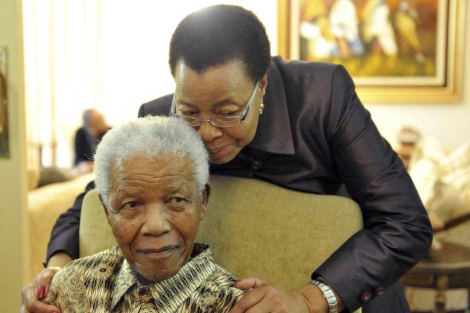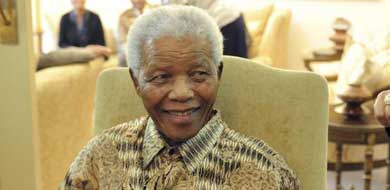Nelson Mandela returned to his home to be with his family in the humble village of Qunu South Africa, far from the luxurious and immense Johannesburg. So what makes a tradition and it has fulfilled the old leader, who has moved to the town with your team doctor and his wife. In Qunu expected to 'Madiba' family, rural people, which has proved enthusiastic about his arrival.
"We are all delighted to see Dalibhunga [name xhosa that was imposed upon turning 16 years for his clan and that means" dialogue coordinator ']. He likes to walk around the field and sit on the balcony and watching the cattle " says his grandson Mandla, a tribal chief in six small villages in the area, among which is included Mvezo, where Mandela was born, who, after the death of his father, was taken to the nearby Qunu.
They grew up and spent his childhood with his mother until she could not keep it and moved back to the nearby village of Mqhekezweni to live with the family of another tribal chief. "All members of the family want to go see him, but know we have to leave him alone and not too stressed. The man is really old.
Do not know if I can take you to Mvezo" acknowledged his grandson and now patriarch. In South Africa it is a tradition that elderly men return home to die with their ancestors. When in January the former president was very ill and feared for his death, his own family members reminded him that "it is time to come home." "We want to go to see him in Johannesburg, but far and we have no money to pay us the ticket," said then the members of his clan.
Mandela, who is not known when he will return to his home in the big city and meets with insurmountable law he learned from an early age. "Neglecting to ancestors unlucky, you can not shame", writes in his memoir, "Long Walk to Freedom." And well done: on Sunday went to join them and honor them. 


"We are all delighted to see Dalibhunga [name xhosa that was imposed upon turning 16 years for his clan and that means" dialogue coordinator ']. He likes to walk around the field and sit on the balcony and watching the cattle " says his grandson Mandla, a tribal chief in six small villages in the area, among which is included Mvezo, where Mandela was born, who, after the death of his father, was taken to the nearby Qunu.
They grew up and spent his childhood with his mother until she could not keep it and moved back to the nearby village of Mqhekezweni to live with the family of another tribal chief. "All members of the family want to go see him, but know we have to leave him alone and not too stressed. The man is really old.
Do not know if I can take you to Mvezo" acknowledged his grandson and now patriarch. In South Africa it is a tradition that elderly men return home to die with their ancestors. When in January the former president was very ill and feared for his death, his own family members reminded him that "it is time to come home." "We want to go to see him in Johannesburg, but far and we have no money to pay us the ticket," said then the members of his clan.
Mandela, who is not known when he will return to his home in the big city and meets with insurmountable law he learned from an early age. "Neglecting to ancestors unlucky, you can not shame", writes in his memoir, "Long Walk to Freedom." And well done: on Sunday went to join them and honor them.



No comments:
Post a Comment